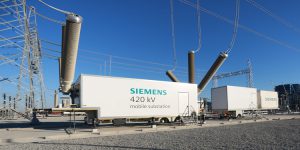
Other key aspects of the agreement include funding concepts that will ensure the long-term sustainability of these infrastructure initiatives ; and creating opportunities during construction and operation for local upskilling and job creation.
The Growth and Transformation Plan of Ethiopia serves as a catalyst to realize its national vision of accelerated and sustained economic growth to eradicate poverty and boost prosperity.
Joe Kaeser, the CEO of Siemens AG said, “Siemens can make a significant contribution to Ethiopia’s development. We will apply our vast experience and proven technologies as well as training and education capabilities to help shape the future of Ethiopia and its people. One of the starting projects affirming our strong commitment in the region is the East Africa Interconnector.”
By building an interconnector between Kenya and Ethiopia, Siemens is currently helping to increase the reliability of energy supply.The transmission line of approximately 1,000 kilometers will transmit environmentally friendly hydroelectricity from Ethiopia to Kenya.
In Ethiopia alone, the project currently supports 200 direct jobs and is one of Africa’s largest infrastructure projects.
The main objective of this agreement is to commit to a long-term partnership between Siemens and the people of Ethiopia to develop fast track solutions that will empower the government to stabilize and expand the existing grid infrastructure, explore industrial park solutions and co-develop microgrid solutions for remote villages.
Sabine Dall’Omo, Siemens CEO for Southern and Eastern Africa says, “This milestone agreement is another step in demonstrating our strong commitment to the people and government of Ethiopia.”
He also went on to say, “We are here today as we have been since 1927, to help achieve affordable and reliable power supply, create jobs, increase access to training and develop local skills alongside local partners.”
